News
KUBS News
CEMS (KUBS Member School) Corporate Partner Survey Results Released
"Professionalism and business acumen alone will not be enough for leadership success after 2030"

The Global Alliance in Management Education, CEMS, of which Korea University Business School (KUBS) is a member, has released research findings conducted in collaboration with 20 multinational corporate partners, revealing a fundamental shift in the core competencies required for successful leadership beyond 2030.
The study was based on interviews with HR and leadership professionals from the 20 CEMS partner companies. While technical expertise and business acumen remain important, there was broad consensus that future leaders must be more human-centric, culturally agile, and entrepreneurial.
CEMS corporate partners have identified five core competencies that will be essential for next-generation leaders in the post-2030 era:
1. Fusion of Analytical Skills and Creativity
Future leaders must go beyond simply interpreting data—they must be able to synthesize complex information, derive strategic decisions, and combine analytical rigor with creative thinking that cannot be replicated by automation or AI.
2. Entrepreneurial Mindset
An entrepreneurial mindset involves the ability to challenge conventional business models, embrace change, and drive purpose-driven innovation. This adaptive and proactive approach is increasingly seen as critical for leadership in a rapidly evolving environment.
3. Cultural Intelligence (CQ)
The ability to effectively communicate and collaborate with teams from diverse cultural backgrounds is emerging as a key determinant of global leadership success. Cultural agility is essential in navigating multicultural teams and global business contexts.
4. Combination of Subject-Matter Expertise and Strategic Business Insight
Future leaders must go beyond general management knowledge. A deep understanding of specific industries—combined with the ability to integrate that expertise into strategic perspectives—will be a key differentiator in driving business success.
5. Digital Agility
While future leaders are not expected to be digital specialists, they must possess a keen awareness of major digital trends and data analytics. Equally important is the ability to bridge communication between technical and business teams to guide effective decision-making.
These competencies underscore the growing importance of human-centered qualities in future leadership. Essential attributes for next-generation leaders now include resilience, adaptability, humility, emotional intelligence, value-driven decision-making, and a strong commitment to physical and mental well-being—as well as to sustainability
Jonathan von Gutzeit, Head of Talent Experience at Lufthansa Group—one of the companies that participated in the research—remarked that “the next generation of leaders must be more than just capable.” He identified ambition, responsibility, and empathy as essential qualities, and added that future leaders should be able to “pioneer new markets through strategic thinking, innovation, and customer-centricity, while cultivating inclusive and empowering organizational cultures.”
Nicolas Barbier of BNP Paribas Portugal also underscored the importance of flexibility, global awareness, and a collaborative mindset. He noted that “those who can think flexibly in rapidly changing environments, adapt well to global organizations encompassing diverse nationalities and cultures, and co-create within teams are the ones who will grow into effective leaders.”

CEMS is a global alliance in international management education, active across six continents and comprising 33 leading business schools, more than 70 multinational companies, and 8 NGOs. Together, they jointly operate the CEMS Master in International Management (MIM) program, which produces over 1,300 graduates each year. Notably, the CEMS MIM was ranked 10th out of 206 programs worldwide in the 2025 QS Master’s in Management Rankings, reaffirming its position among the world’s top programs.
Korea University Business School, the only CEMS member school in South Korea, operates the CEMS Global MIM program and is dedicated to cultivating the next generation of global leaders through a practice-oriented international curriculum that includes overseas study, internships, and corporate projects.
The five core competencies identified by CEMS—△the fusion of analytical skills and creativity, △an entrepreneurial mindset, △cultural intelligence, △the combination of expertise and strategic business insight, and △digital agility—are closely aligned with the educational philosophy of Korea University Business School (KUBS).
Looking ahead, KUBS will further strengthen its integrated leadership education, encompassing interdisciplinary themes such as AI, ESG, multicultural management, and human-centered design. Through robust support across education, research, and industry-academia collaboration, the school is committed to fostering authentic and sustainable global leaders capable of creating meaningful value on the international stage.


